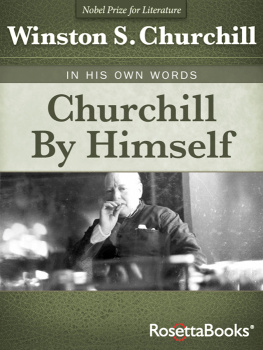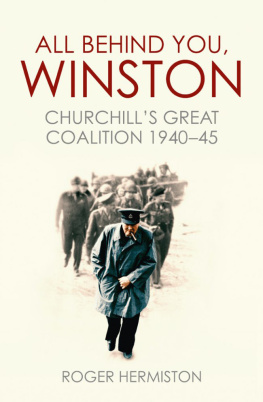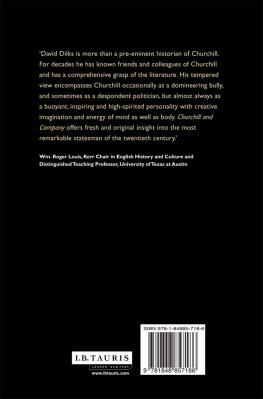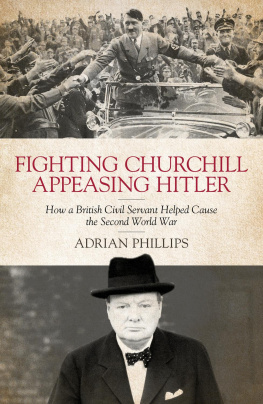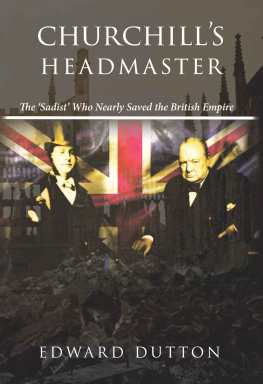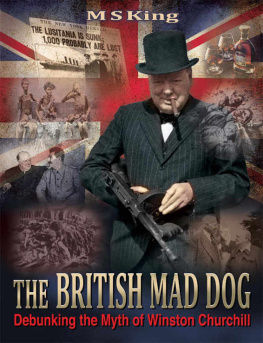War has a way of masking the stage with scenery crudely daubed with fearsome apparitions.
War is a game that is played with a smile. If you cant smile, grin.
WINSTON S. CHURCHILL , in the trenches near Ploegsteert
People go into hiding even when no one is looking for them.
There is nothing more deceptive than an obvious fact.
The British enjoy deceiving their enemies. When the Prussian strategist Carl von Clausewitz defined war in 1833 as those acts of force to compel our enemy to do our will, he missed out the dimension that the British political philosopher Thomas Hobbes had spotted nearly two centuries earlier: Force and fraud are in war the two cardinal virtues.
Sir Alan Lascelles called Winston Churchill the Arch-Mountebank and he certainly had a penchant for display. No other British twentieth-century politician was photographed in so many different kinds of headgear as Churchill: whether in boater, bowler, cocked hat, flying helmet, homburg, peaked cap, sombrero, sola topi, souwester, Stetson, topper or Tommys tin hat, he always dressed the part.
Acting is a long-established area of British talent. The British like to pretend, observes a former US Ambassador, Raymond Seitz. They seem to prize few things so much as a good performance. And the theatre director Richard Eyre notes the national love of ritual, procession and dressing-up. On the surface they are so open, writes novelist Geoffrey Household of his countrymen, and yet so naturally and unconsciously secretive about anything which is of real importance to them. British self-deprecation, wit and irony are also forms of concealment. The British do not say what they mean, or mean what they say, and often mask seriousness with jokes as a cover for shyness or sentiment. Jorge Luis Borges says of Herbert Ashe in Ficciones: He suffered from unreality, like so many of the British.
On 10 February 1910, a party of six well-bred young people conned their way on to the flagship of the Royal Navys Home Fleet, HMS Dreadnought, by impersonating the Emperor of Abyssinia and his suite. A guard of honour met the train at Weymouth, and an admiral and a commander showed them over the ship. Among these impostors was a Prince Mendax, blacked up and false-bearded by the famous theatrical costumier Willie Clarkson of Wardour Street, and complete with turban, caftan and heavy gold chain. Prince Mendax was in fact the future modernist novelist and literary heroine Virginia Woolf. It was a good hoax to play on the Royal Navy that sustained the British Empire at its height. But aristocratic bluff was also a deceptive performance skill that helped the people of a small island nation to rule a vast worldwide empire.
Of course, military deception (MILDEC), which the US Joint Chiefs define as actions executed to deliberately mislead adversary decision makers as to friendly military capabilities, intentions and operations, has been used all over the world. In China 2,400 years ago, Sun Tzu said in The Art of War that All warfare is based on deception. The hadith or proverb, al-harb khuda, attributed to the Prophet Muhammad peace be upon him also means war is deception. The famous stratagem that toppled Troy was the Greek gift of a wooden horse with a special force, including the wily Odysseus, hidden inside.
The Trojan War was fought over a sexually attractive woman, and deception has deep roots in biology. Vladimir Nabokov observed that Everything is deception from the insect that mimics a leaf to the popular enticements of procreation. Deception also marks predatorprey relations. Weaker animals evolve disguises or camouflages to protect themselves against more powerful ones. Human animals, however, are uneasy with the idea of deception because it confers unfair advantage and destroys cooperation. In TheRepublic, Plato said that only the rulers of the city are entitled to tell lies, and then only in order to benefit the city and in direct response to the actions of enemies or troublesome citizens.
The British developed deception in both World Wars as a response to dangers represented by new military technologies on land, at sea and in the air. This was especially true in WW2, when the weakened nation had its back to the wall after the rest of Europe had fallen into what Churchill called the grip of the Gestapo and all the odious apparatus of Nazi rule. It is against Nazi Germany that Britain developed some of the most sophisticated and brilliant deceptions in history. Winston Churchills interest in secrecy and deception, however, goes back to the beginning of WW1.
In July 1911, during the Agadir crisis, Churchill was Home Secretary, and was talking to the Chief Commissioner of Police at a Downing Street garden party. Germany was flexing some naval muscle in Morocco. The Chief Commissioner mentioned that the Home Office was responsible for guarding two magazines where the Royal Navy stored its explosives, and that only a few constables were on the job. Churchill asked what might happen if twenty determined Germans in two or three motor cars arrived well armed upon the scene one night, and was told such a force could not be held off. Churchill promptly quitted the garden party, armed and reinforced the Metropolitan Police and called out the British Army to help secure the cordite reserves. This set him thinking about espionage and counter-espionage, and he signed new warrants to allow the mail of suspected German agents to be opened. As First Lord of the Admiralty in 1914, one of his earliest Most Secret memos of wartime gave instructions to build a dummy fleet of ten large merchant vessels mocked up in wood and canvas to look like far bigger battleships in silhouette, so as to baffle and distract enemy aeroplanes and submarines. Three of these battleships were sent to the Dardanelles in February 1915 to lure the German fleet out into the North Sea.
As a young man, he scorned dishonesty I had no idea in those days of the enormous and unquestionably helpful part that humbug plays in the social life of great peoples dwelling in a state of democratic freedom but Churchill came thoroughly to approve of deception in warfare. This book argues that British twentieth-century military deception has four pillars: camouflage, propaganda, secret intelligence and special forces. Churchill was excited by T. E. Lawrences ideas about guerrilla warfare, based on disguise and surprise rather than frontal assault, and it was in Churchills prime ministership that the Commandos and the SAS were founded. He also became a master of propaganda who, as the broadcaster Edward R. Murrow said, mobilized the English language and sent it into battle.
Native cunning links all Churchills wizards, creative people using their skills to help their country in a struggle for survival. The two World Wars recruited widely from the nations pool of talent, not just from the narrow caste of professional soldiers. This book is about artists and scientists, film and theatre people, novelists and naturalists, as well as daredevils, commandos and the Home Guard who disguised machine-gun posts as gentlemens toilets or genteel tearooms.
The first half of the book is about WW1, in which the first British explorations of camouflage brought together the skills of the big-game hunter Hesketh Prichard, the theatre-hand Oliver Bernard and the society portrait painter Solomon J. Solomon. The Oxford archaeologist T. E. Lawrence dressed up in white robes and became Lawrence of Arabia, George Bernard Shaw (in khaki and tin hat) sent polemical dispatches from the trenches, and the popular author John Buchan became the head of British propaganda. The second half of the book is about WW2, and introduces two little-known geniuses, the larger-than-life, German-speaking

![Nicholas Rankin [Nicholas Rankin] Churchills Wizards](/uploads/posts/book/56578/thumbs/nicholas-rankin-nicholas-rankin-churchill-s.jpg)
